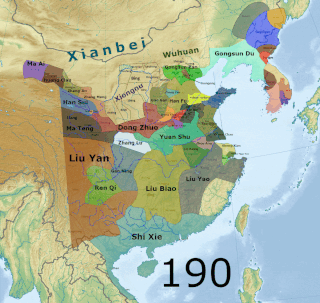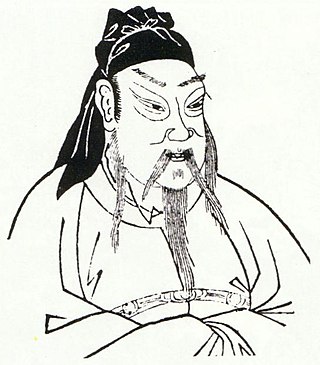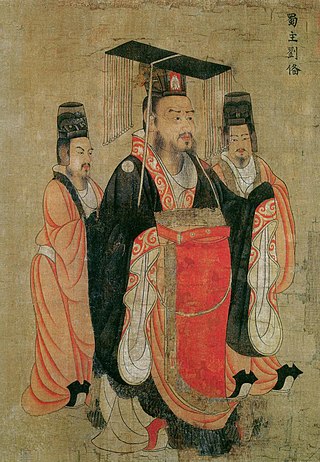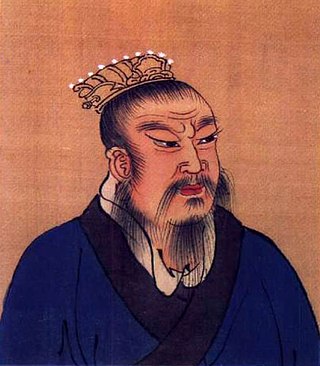
Turandot is an opera in three acts by Giacomo Puccini to a libretto in Italian by Giuseppe Adami and Renato Simoni. Puccini left the opera unfinished at the time of his death in 1924; it premiered in 1926 after the music was posthumously completed by Franco Alfano.

The Three Kingdoms of Cao Wei, Shu Han, and Eastern Wu dominated China from 220 to 280 AD following the end of the Han dynasty. This period was preceded by the Eastern Han dynasty and followed by the Western Jin dynasty. Academically, the periodisation begins with the establishment of Cao Wei in 220 and ends with the conquest of Wu by Jin in 280. The period immediately preceding the Three Kingdoms, from 184 to 220, was marked by chaotic infighting among warlords across China as Han authority collapsed. The period from 220 to 263 was marked by a comparatively stable arrangement between Cao Wei, Shu Han, and Eastern Wu. This stability broke down with the conquest of Shu by Wei in 263, followed by the usurpation of Cao Wei by Jin in 266 and ultimately the conquest of Wu by Jin in 280.

劉 / 刘 is an East Asian surname. pinyin: Liú in Mandarin Chinese, Lau4 in Cantonese. It is the family name of the Han dynasty emperors. The character 劉 originally meant 'battle axe', but is now used only as a surname. It is listed 252nd in the classic text Hundred Family Surnames. Today, it is the 4th most common surname in mainland China as well as one of the most common surnames in the world.

Song, known as Liu Song, Former Song (前宋) or Song of (the) Southern dynasties (南朝宋) in historiography, was an imperial dynasty of China and the first of the four Southern dynasties during the Northern and Southern dynasties period. It succeeded the Eastern Jin dynasty and preceded the Southern Qi dynasty.

Lucy Alexis Liu is an American actress. Born in New York City to Chinese immigrant parents, her accolades include a Critics' Choice Television Award as well as nominations for two Primetime Emmy Award.

Romance of the Three Kingdoms is a 14th-century historical novel attributed to Luo Guanzhong. It is set in the turbulent years towards the end of the Han dynasty and the Three Kingdoms period in Chinese history, starting in 184 AD and ending with the reunification of the land in 280 by the Western Jin. The novel is based primarily on the Records of the Three Kingdoms, written by Chen Shou in the 3rd century.

Guan Yu, courtesy name Yunchang, was a Chinese military general serving under the warlord Liu Bei during the late Eastern Han dynasty of China. Along with Zhang Fei, he shared a brotherly relationship with Liu Bei and accompanied him on most of his early exploits. Guan Yu played a significant role in the events leading up to the end of the Han dynasty and the establishment of Liu Bei's state of Shu Han during the Three Kingdoms period. While he is remembered for his loyalty towards Liu Bei, he is also known for repaying Cao Cao's kindness by slaying Yan Liang, a general under Cao Cao's rival Yuan Shao, at the Battle of Boma. After Liu Bei gained control of Yi Province in 214, Guan Yu remained in Jing Province to govern and defend the area for about seven years. In 219, while he was away fighting Cao Cao's forces at the Battle of Fancheng, Liu Bei's ally Sun Quan broke the Sun–Liu alliance and sent his general Lü Meng to conquer Liu Bei's territories in Jing Province. By the time Guan Yu learned about the loss of Jing Province after his defeat at Fancheng, it was too late. He was subsequently captured in an ambush by Sun Quan's forces and executed at Linju, Xiangyang Commandery.

Liu Bei, courtesy name Xuande (玄德), was a Chinese warlord in the late Eastern Han dynasty who later became the founding emperor of Shu Han, one of the Three Kingdoms of China.

Han (漢; 221–263), known in historiography as Shu Han (蜀漢 ) or Ji Han (季漢 "Junior Han"), or often shortened to Shu (Chinese: 蜀; pinyin: Shǔ; Sichuanese Pinyin: Su2 < Middle Chinese: *źjowk < Eastern Han Chinese: *dźok), was a dynastic state of China and one of the three major states that competed for supremacy over China in the Three Kingdoms period. The state was based in the area around present-day Hanzhong, Sichuan, Chongqing, Yunnan, Guizhou, and north Guangxi, an area historically referred to as "Shu" based on the name of the past ancient kingdom of Shu, which also occupied this approximate geographical area. Its core territory also coincided with Liu Bang's Kingdom of Han, the precursor of the Han dynasty.

Emperor Gaozu of Han, also known by his given name Liu Bang, was the founder and first emperor of the Han dynasty, reigning from 202 to 195 BC. He is considered by traditional Chinese historiography to be one of the greatest emperors in history, credited with establishing the first Pax Sinica, one of China's longest golden ages.

Emperor Guangwu of Han, born Liu Xiu (劉秀), courtesy name Wenshu (文叔), was a Chinese monarch. He served as an emperor of the Han dynasty by restoring the dynasty in AD 25, thus founding the Eastern Han dynasty. He ruled over parts of China at first since his dynasty was formed through rebellion against the short-lived Xin dynasty, and through suppression and conquest of regional warlords, the whole of China proper was consolidated by the time of his death in AD 57. During his reign, Taoism was made the official religion of China, and the Chinese folk religion began to decline.

Emperor Xian of Han, personal name Liu Xie (劉協), courtesy name Bohe, was the 14th and last emperor of the Eastern Han dynasty in China. He reigned from 28 September 189 until 11 December 220.

Long Island University (LIU) is a private university with two main campuses, LIU Post in Brookville, New York, on Long Island, and LIU Brooklyn in Brooklyn, New York City. The university offers over 500 academic programs at its main campuses, online, and at multiple non-residential locations. LIU has an NCAA Division I athletics program, and hosts and sponsors the annual George Polk Awards in journalism.

LIU Post, formally the C.W. Post Campus of Long Island University and often referred to as C.W. Post, is a private university in Brookville, New York, on Long Island. It is part of Long Island University (LIU), and the largest university in the LIU system.

The end of the Han dynasty was the period of Chinese history from 189 to 220 CE, roughly coinciding with the tumultuous reign of the Han dynasty's last ruler, Emperor Xian. It was followed by the Three Kingdoms era. During the end of the Han dynasty, the country was thrown into turmoil by the Yellow Turban Rebellion (184–205). Meanwhile, the Han Empire's institutions were destroyed by the warlord Dong Zhuo and fractured into regional regimes ruled by various warlords, some of whom were nobles and officials of the Han imperial court. The warlord Cao Cao took control of Emperor Xian and his court in 196 and began gradually reunifying the empire. Cao Cao ostensibly operated under Emperor Xian's rule, though in reality the emperor was a hostage.

Liu Xiaobo was a Chinese literary critic, human rights activist, philosopher and Nobel Peace Prize laureate who called for political reforms and was involved in campaigns to end Chinese Communist Party one-party rule in China. He was arrested numerous times, and was described as China's most prominent dissident and the country's most famous political prisoner. On 26 June 2017, he was granted medical parole after being diagnosed with liver cancer; he died a few weeks later on 13 July 2017.

Ascophora is an infraorder under order Cheilostomatida of the Bryozoa.

Ken Liu is an American author of science fiction and fantasy. Liu has won multiple Hugo and Nebula Awards for his novel translations and original short fiction, which has appeared in F&SF, Asimov's Science Fiction, Analog, Lightspeed, Clarkesworld, and multiple "Year's Best" anthologies.

Liu Shaoqi was a Chinese revolutionary and politician. He was the chairman of the Standing Committee of the National People's Congress from 1954 to 1959, first-ranking vice chairman of the Chinese Communist Party from 1956 to 1966, and the chairman of the People's Republic of China, the head of state from 1959 to 1968. He was considered to be a possible successor to Mao Zedong, but was purged during the Cultural Revolution.

Simu Liu is a Canadian actor. He is known for portraying Shang-Chi in the 2021 Marvel Cinematic Universe film Shang-Chi and the Legend of the Ten Rings. He also played Jung Kim in the CBC Television sitcom Kim's Convenience from 2016 to 2021, and one of the Ken dolls in Barbie (2023). He received nominations at the ACTRA Awards and Canadian Screen Awards for his work in Blood and Water.



















